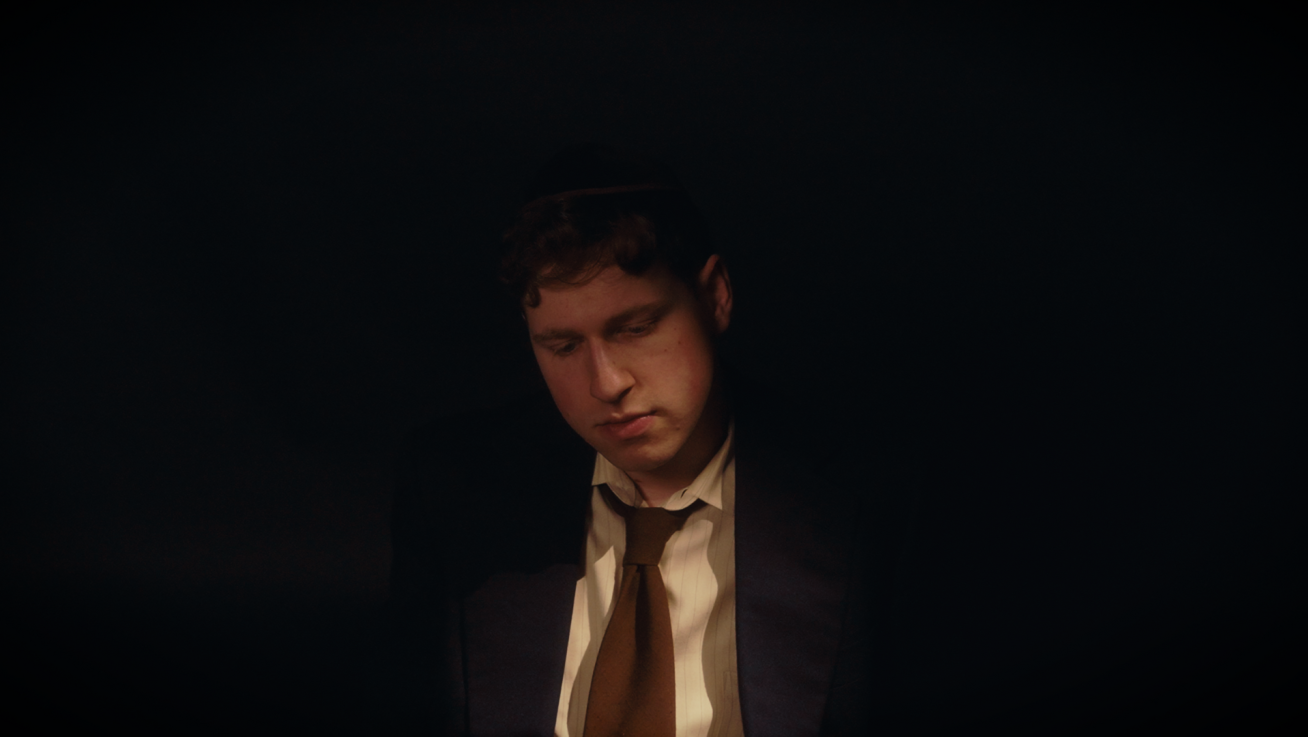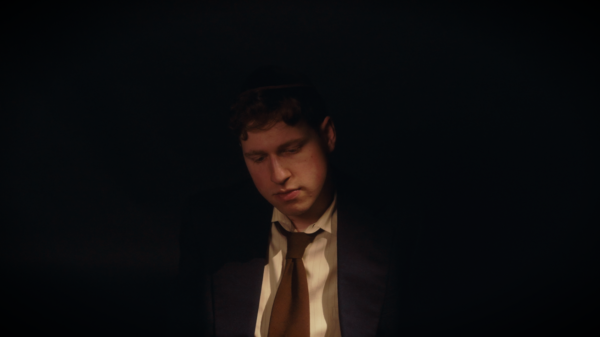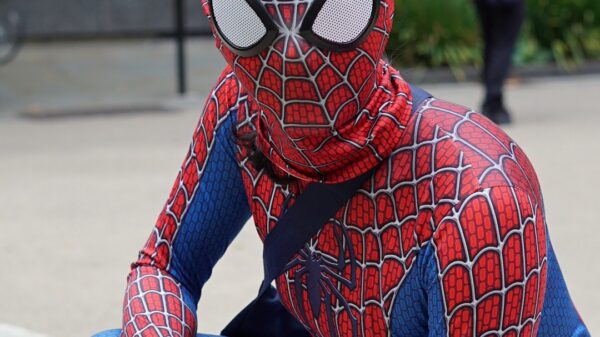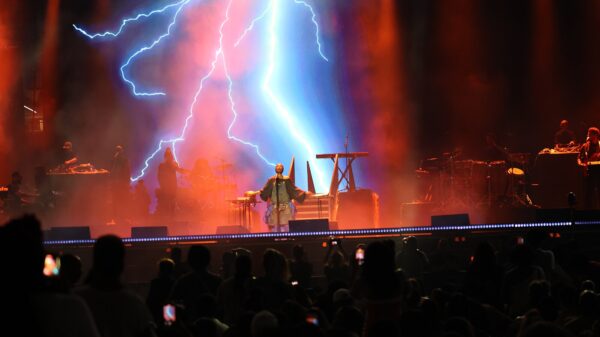Staff writer Polly Symes interviews Brooklyn based alt-pop artist Alnev on his new EP and everything you left was blue
In October 2025, Alnev reached out to me via email after having read my album review of Conan Gray’s Wishbone. He thought I would enjoy his latest EP, given that Conan Gray is one of the artists he draws inspiration from. Listening to a pre-release of Alnev’s and everything you left was blue, his rich vocals, vulnerable lyrics and thoughtful production impressed me. So I asked him if he’d like to do a Zoom interview. What follows is part of our two hour conversation about music-making, songwriting, performing live, and being an artist in the digital era.
Polly: The first thing I wanted to ask you was about your name, you go by Alnev, but your real name is Ari. Is there a story behind the pseudonym?
Alnev: Alnev is Hungarian for pseudonym. So my pseudonym is pseudonym. Alnev for me is the part of my soul that creates music.
Polly: Was it important for you to have a different name to separate work and life?
Alnev: I want to be famous. In life, I’ve always been a pretty open book… I only have one life and I’d rather live it being as much me as possible. I really just chose it [the pseudonym] because I thought I thought it needed a brand and curation. I always name things. My guitar has a name.
Polly: What’s your guitar’s name?
Alnev: My guitar’s name’s Noel.
Polly: If you were to introduce yourself as an artist to someone who had never listened to your songs, what would you say?
Alnev: In general, I describe the music I make as alternative pop singer-songwriter. It’s alternative because it’s inspired by all different genres and I’m never limited to one. I am the sound. This project right now [and everything you left was blue] is singer-songwriter/pop/ballads, but the next one’s going to be completely different. When I’m vulnerable and honest and express myself, that’s the kind of music that people are like “dude, you said exactly what I’m feeling and thinking, but I just didn’t know how to say it.” And that makes me certain that I’m doing the right thing.
Polly: Who are the artists that inspire you the most?
Alnev: My top five are Panic at the Disco, Frank Sinatra, Lorde, Julia Michaels, and Laufey. We can go further, like Billie Eilish, Lewis Capaldi, Conan Gray. My top two [records] of the year are probably Audrey Hobert’s record, Who’s the Clown (she wrote That’s So True with Gracie Abrams), also Addison Rae’s record [Addison] was phenomenal.
Polly: With your songwriting, when did you first start begin your journey and what’s your process?
Alnev: 9th grade -we had the morning prayers, and I would sit and write poetry. And my friend dared me to write a song. That was the first song I wrote. And then, in 10th grade, I was in this alternative Jewish school in Pennsylvania. And I was processing my childhood and started writing. I kept doing it and I got better at it and I was playing more piano, ukulele, guitar. There’s never been an official process. It can be different every time. I’m a very lyrics-focused person. Sometimes I’ll be in the shower and an idea will pop into my head, like how Van Gogh showed up for me.
Polly: Van Gogh, the track that went viral…what do you think it was about that song that connected with people? Alnev: I think it’s a magnificent song. It’s extremely deep, but also has space for people to really latch onto their own take on it. A lot of messages of wanting to be noticed and seen, the struggle of life, the struggle of being an artist. Also it’s a chorus that just sticks in your head.
Polly: So you taught yourself piano, ukelele and guitar. Do you produce?
Alnev: One of the songs on the EP, I produced. Some of my future stuff I’ve been producing. I’ve always been the executive producer with my friends. Only in the last two years have I been really trying to get into producing more. I’m still learning that side.
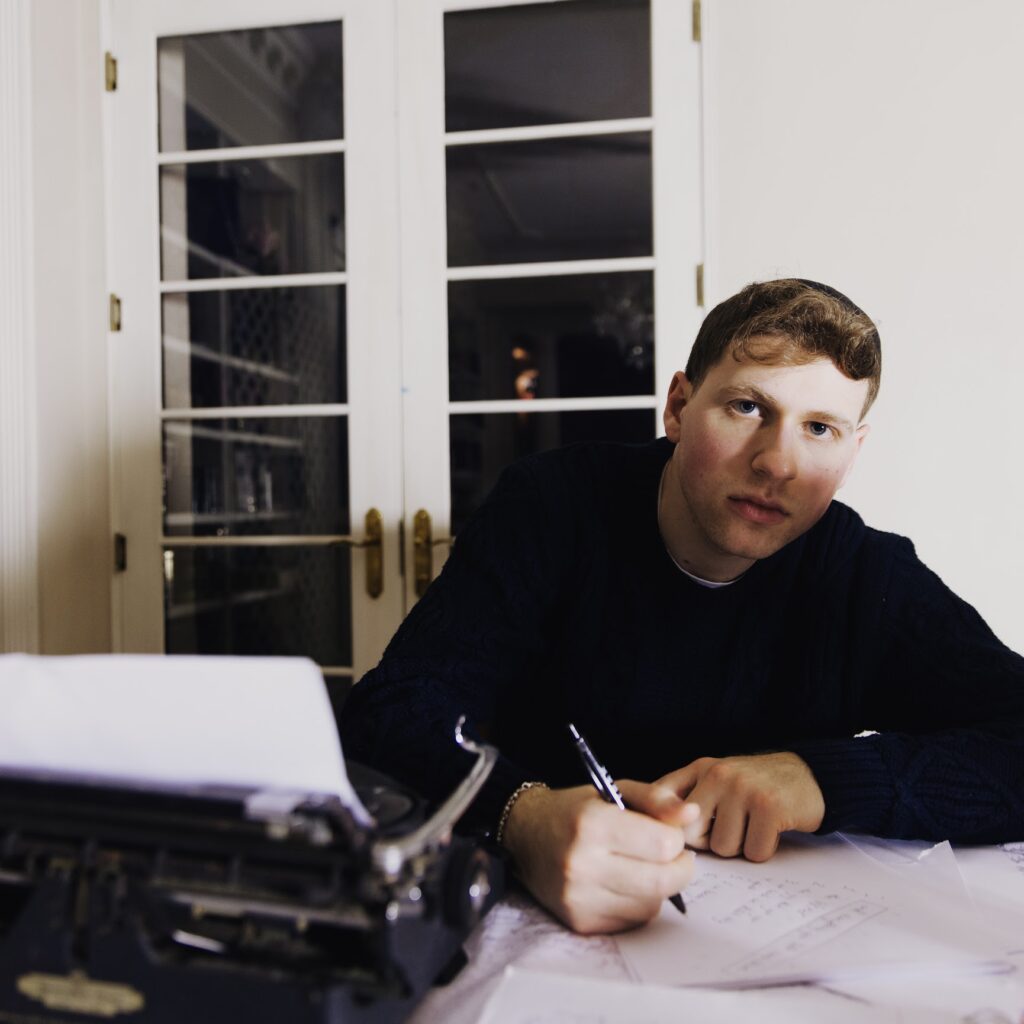
Polly: On your EP, and everything you left was blue, you kick-off with The Writer, a very catchy tune. But then later, the pacing slows with some sadder songs. Was your aim to have a varied pace across the EP?
Alnev: I lean much more toward writing sadder, slower things. So when I have something that’s fun and can be a little more fast-paced, it’s really exciting. When I wrote The Writer, I was like “Oh my God, this has to be on the project.” The real thing for me about projects is they’re all centered around a theme, even if the sound isn’t exactly the same. So this project [and everything you left was blue] is really focused on heartbreak, loss, grief, relief, all these feelings associated with the blue…There was someone who I thought was my soulmate. We never dated. I realized they weren’t because they married someone else. It was a long, four-year thing. This project is giving that experience some air to breathe.
Polly: So this, the theme of this EP is the blue and the breakup… how does it compare to Vincent, your first EP?
Alnev: Vincent was the one I started when I moved to New York in 2020. I grew up in Florida, was in this boarding school in Pennsylvania, and then COVID hit so we all went home. Then I went to New York for a wedding, and was like “maybe I should move here”. I wanted to be a therapist…I love helping people. But music was taking over. So I decided, I’m moving to New York! It’s hard, but also the greatest thing ever. I’m in the greatest city on earth, I love meeting people, the subways running 24/7 and that whole life, tons of people, the wildest stories. Vincent only came out in 2024 and it was this whole journey, me and my friends figuring out how to produce, so that EP, thematically, is really a birth. Genre-wise, I really wanted that diversity on that first record. This one [and everything you left was blue] is much more streamlined, more like there is one particular message. The biggest difference for me, which I’m happiest about is just like, we got way better at making the music! I have a new mixer now who’s unbelievable. His name’s Harper James. Polly: Is there something about the EP format that appeals to you? Would you like to build up to an album in the future?
Alnev: For me, the EP format is so helpful because the term “album” scares the shit out of me! When I think of albums, I think of Melodrama, Kid Crow, folklore, these iconic, funded, enormous projects…it’s a matter of funding. When you have the funds to make an enormous record with all the visuals, an album makes sense. In my current state, thinking a little smaller takes some pressure off me.
Polly: It makes sense. And funding-wise, would you like to secure a label in the future?
Alnev: For a label deal, it’s a matter of leverage. If I’m in a place where I have good enough leverage as an artist to get a great deal, I don’t see a reason why I wouldn’t do it. But right now, even if a label wanted me, the deal that they would offer me wouldn’t work because I don’t have leverage. I haven’t built a functional, sustaining business that is making more money than it’s losing. It would be really nice to have a team of people. And also not worrying about money, because when you’re signed to a label, getting that advance and being able to live and not worry about anything but music…there’s a lot of advantages to like a good label deal.
Polly: Are you having to juggle work on the side of music or are you full-time music making?
Alnev: I’ve been doing full-time music for the last year and a half. I was also a barista in the past. I worked with special needs kids at some point. But I’ve been trying to do music full-time. It’s been really hard. I’m not in a place where I’m normal, unstable from it. To really live off music, you have to be in the top 10%. So the goal is to get up there. And now there’s other things I’m looking into, other music-related work, like helping my mixer. But I only want money so I can spend it on making more music.
Polly: To be an artist these days, having a social media presence is so important. What’s your approach?
Alnev: I have different strategies. There’s been times where it was really hard for me. But I figured out what works for me. Twitter is my fun spot. It’s just me rambling about nothing. The goal with TikTok is really just consistency, quantity, small waves rather than dying to have a viral video. With Instagram, I’m a little nervous because Instagram and Spotify are like my resume. But I’m still figuring out my relationship with all these platforms and how to make it work. On the one hand, it’s so difficult to be a content creator. I never wanted to be a guy who makes short videos, I want to make music. On the other hand, with these platforms, there’s so much potential to connect with new audiences. In terms of accessibility to be an artist build a following, this is the most accessible time by far. Polly: I noticed that in a lot of your social media content, you’re wearing the kippah. Was that a conscious, representational choice, or was it more about being authentic?
Alnev: It definitely leans on the second. I grew up in the ultra-orthodox [Jewish] community. I understand Hebrew. I grew up very religious. I still believe in it and I connect to it, but I’m trying to figure out exactly where it works for me. I’ve always worn a kippah my entire life. As a Jew, what it [the kippah] represents is like, God is above you. At some point, it just becomes part of what you wear. And I never would imagine myself without it. I definitely believe in God personally. And I’m proudly Jewish.
Polly: Finally, you’ve recently opened at the Gramercy Theatre in New York and Music Hall, Williamsburg. Do you enjoy performing live?
Alnev: The top two experiences I’ll ever have as an artist is hearing someone tell me how they’ve been affected by music, and when people sing along at shows to songs. It’s like, wow, people, we’re doing this together. I love performing live. It makes it feel real. I’m opening at Mercury Lounge on November 23rd, which I’m really excited about because I’m going to have a little band with me. We’re going to play some of the new stuff. Yeah. So I love live. It’s the best.
Polly: You’ll have to organize a date in in London!
Alnev: I would love to! I’ve been to London a bunch of times because my dad’s from there. I hate it and I love it. The weather is so bad like 90% of the year but like I love the tube, I love the accent, I love the culture. There’s so much to see. I can’t wait to go back.
Polly: We love London too! Do you have any final words to close this conversation?
Alnev: To me, the goal of what I’m doing is just like make as many people feel less alone, feel more seen, understood, heard. I appreciate you for being a part of this.
Second-year undergraduate at King’s College London reading Culture, Media and Creative Industries.

